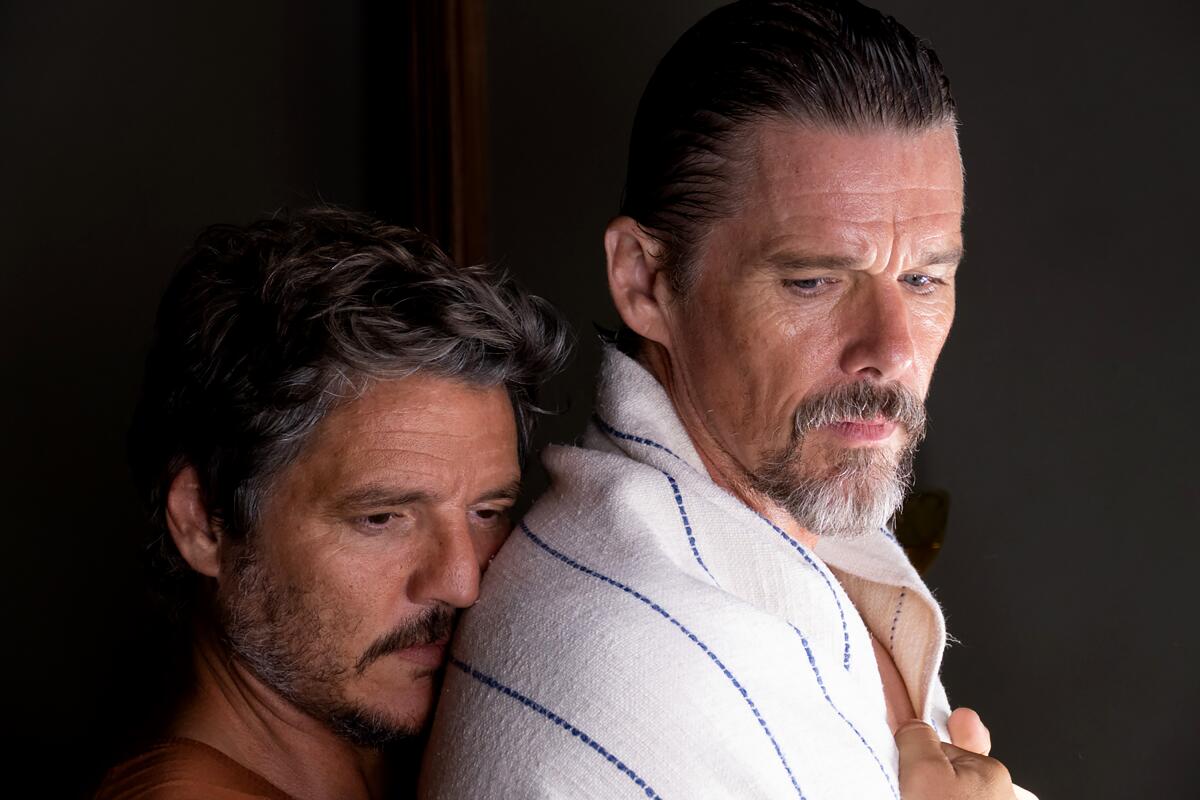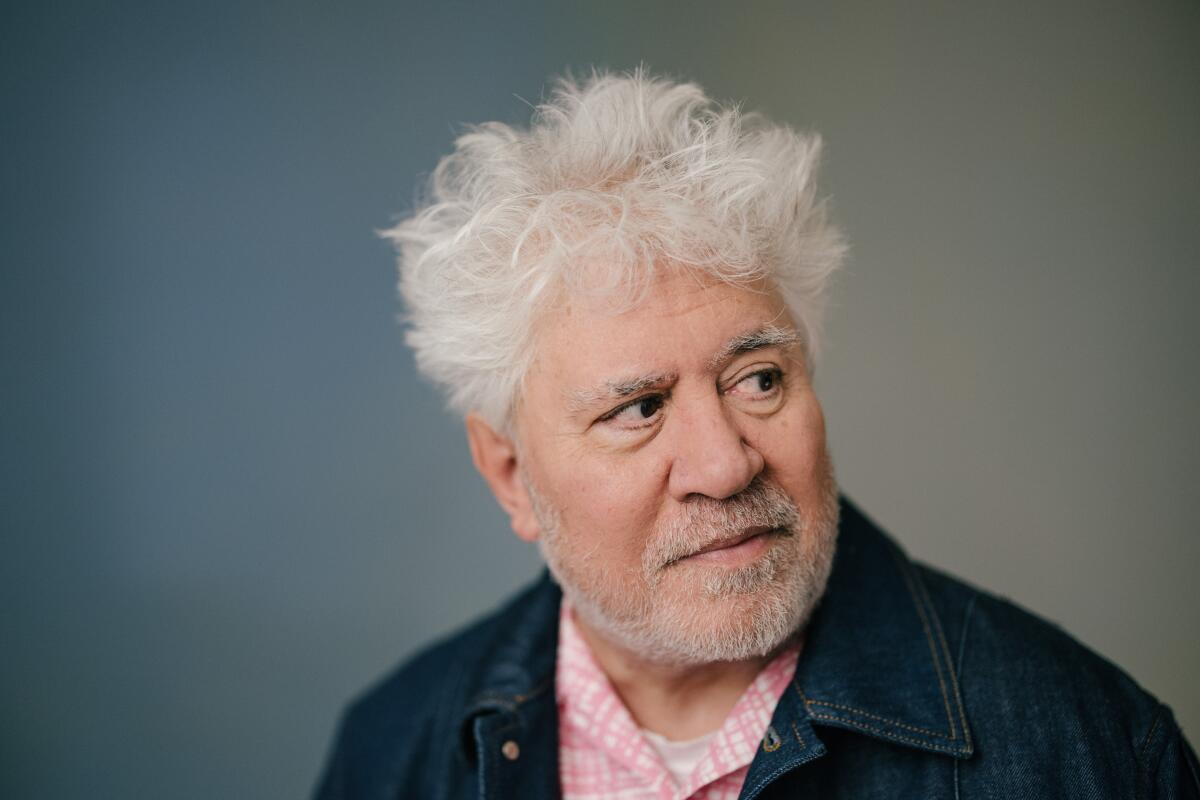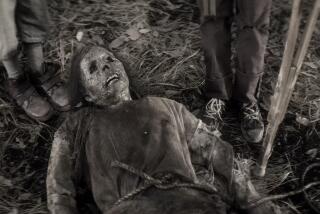Pedro Almodóvar puts his own stamp on the western with short ‘Strange Way of Life’

- Share via
A Pedro Almodóvar short can elicit violently mixed feelings. On the one hand: What a remarkable, concentrated burst of creativity. Then again: Where’s the rest of it? I want more. It’s a little bit like reading a Hemingway short story (say, “The Killers”) rather than one of his great novels (we’ll stay in Almodóvar’s native Spain and go with “The Sun Also Rises”).
But the director of the 31-minute western “Strange Way of Life,” which premiered at the Cannes Film Festival in May and is eligible to be nominated for an Oscar for live-action short, doesn’t see it that way. For him, making shorts, including “Strange Way” and 2020’s “The Human Voice,” feels thrilling and new. “It makes me feel like I am at the beginning of my career,” he says in a video interview from his home office in Madrid. “The small format gives me a lot of freedom. That doesn’t mean that I’m not free when I make a feature. But making shorts is very exciting for me.”
Ethan Hawke and Pedro Pascal inject homoerotic tension into their classically male personae in this provocative mini-Western by filmmaker Pedro Almodóvar.
Almodóvar, 73, welcomes any opportunity to keep things fresh. He directed his first feature, “Folle … folle … fólleme Tim!,” in 1978, and has been cranking them out ever since. He’s an international brand, one of a handful of non-English language filmmakers to win a screenwriting Oscar (for 2002’s “Talk to Her”). He makes thrillers, he makes melodramas, he makes wickedly funny comedies. But to some extent you generally know what you’re getting with an Almodóvar film. Boldly poetic handling of queer themes and characters. Eye-popping production design and color palette. Empathetic treatment of societal transgression.
“Strange Way of Life” has all of the above. It’s the story of an Old West sheriff, Jake (Ethan Hawke), reunited with an old lover, Silva (Pedro Pascal), under less-than-ideal circumstances. The brother of Jake’s wife has been murdered, and the prime suspect is Silva’s son. Silva has come to ask for mercy. Jake is reluctant to give it. It’s a hothouse tale of divided loyalty and simmering passion and resentment. And it’s all over in what feels like the blink of a dust-speckled eye.
Almodóvar says the film started small, with “the idea of these two guys and the conversation that they have after a night of sex and alcohol.” He briefly thought of doing it as a modest play. Then he thought, “it would be stronger and more powerful or more original if they were cowboys.” He’s a fan of the western genre, counting John Ford, Howard Hawks and John Sturges as his favorite practitioners. “But this is a topic that is not very usual in the western — the desire between two men,” he says. “And that gave me a reason to make something that I felt was mine. It is a western that belongs to me.”

In keeping with the theme of trying new things, both “Strange Way of Life” and “The Human Voice” are English-language films, the first of Almodóvar’s career. He conducts this interview with a translator present, but he rarely uses her services.
He says the choice of language for “Strange Way of Life” was largely a matter of honoring the western. “This is an American genre,” he says. “It was created there. We have also a European tradition with Sergio Leone and spaghetti westerns, but I prefer to think about the American classics. I tried not to be anachronistic, because I felt that this genre belongs to someone else, and I wanted to respect the rules.”
Actually, Almodóvar has made another short, of sorts. Tucked inside “Talk to Her” is a ribald, fantastical, stand-alone silent film called “The Shrinking Lover,” which clocks in at nine minutes. Almodóvar wrote it several years before he made “Talk to Her,” which merely provided the right opportunity to showcase it. “I have a bank of little fiction that exists because I like to write it without a finality,” he says. “With time, some of them become part of my movies.”
With “Strange Way of Life,” he made a generous withdrawal from that bank. He admits that Jake and Silva lingered in his mind once the shoot was done. He kept writing more of their story. He has even played with the idea of making a feature-length, Sam Peckinpah-like western set in Mexico.
“Perhaps one day I’ll do it,” he says. “I don’t know. At the moment, I wanted to make this.”
More to Read
From the Oscars to the Emmys.
Get the Envelope newsletter for exclusive awards season coverage, behind-the-scenes stories from the Envelope podcast and columnist Glenn Whipp’s must-read analysis.
You may occasionally receive promotional content from the Los Angeles Times.







